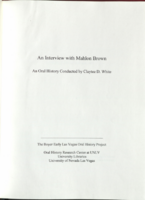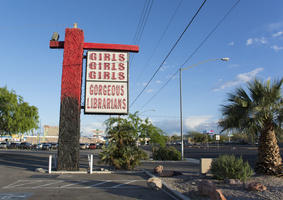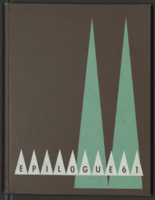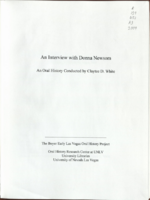Search the Special Collections and Archives Portal
Search Results

Back of dancing postcard
Date
Description
Image

Back of postcard
Date
Description
Image

Transcript of interview with Mahlon Brown by Claytee D. White, December 16, 2003
Date
Archival Collection
Description
Text

Photographs of The Library Gentlemen's Club, Las Vegas (Nev.), March 27, 2017
Date
Archival Collection
Description
Site address: 3785 Boulder Hwy
Sign owner: K C Investco LLC
Sign details: 0.90 acre lot, original construction year was 1982. Property was shut down temporarily, but reopened in May 2017.
Sign condition: 4 - looks in fine condition
Sign form: Back to Back Pole Sign
Sign-specific description: Double sided pole sign with what looks like cement or brick like structure. It has a wooden pole sticking out of the top to then have a hanging sign underneath it that spells out "GIRLS GIRLS GIRLS GORGEOUS LIBRARIANS" with a white background and red lettering. At night there is bright red skeleton neon around the lettering on the sign. The structure is painted red with black on the lower half.
Sign - type of display: Neon
Sign - media: Steel and plastic
Sign environment: Property is located near other local businesses and a residential neighborhood
Sign - date of redesign/move: Possible repaint before May 2017 reopening
Sign - artistic significance: The Library uses images of women dressed in professional wear, to play off the notation of the "naughty librarian."
Survey - research locations: Assessor's website
Survey - research notes: https://www.wantickets.com/Events/221951/The-Library-Gentlemen-s-Club-Grand-Opening-MDW-2017-Events/ https://www.palominolv.com/blog/las-vegas-strippers-a-brief-history/ - history of gentlemen clubs in las vegas Opening date unknown, but was receiving online reviews as far back as 2008.
Surveyor: Danny Jacobs
Survey - date completed: 2017-09-11
Sign keywords: Neon; Steel; Plastic; Back to back; Pole sign; Hanging
Mixed Content

Epilogue: Nevada Southern University Yearbook, 1961
Date
Description
Yearbook main highlights: schools and departments; detailed lists with names and headshots of faculty, administration and students; variety of photos from activities, festivals, campus life, and buildings; campus organizations such as sororities, fraternities and councils; beauty contest winners; college sports and featured athletes; and printed advertisements of local businesses; Institution name: Nevada Southern University, Las Vegas, NV
Mixed Content

Transcript of interview with Robert "Bob"Agonia by Marcela Rodriguez-Campo, September 6, 2018
Date
Archival Collection
Description
Robert “Bob” Agonia (1938- ) was born in Garden Grove, California on a migrant camp made up of Filipino and Mexican-American workers. Agonia’s father was a farmer on a 70 acre farm owned by the Beggs family. Agonia did not spend much time living on the migrant camp, as his father moved the family to a private residence when Agonia was four. Agonia attended school, during an era of school desegregation in Garden Grove. He recalls that his mother dealt with segregation during her schooling, being forced to attend a school miles down the road from her home despite living across the street from another school. Agonia recalls his community being very diverse with families sharing Filipino and Mexican-American heritage and his neighbors being Japanese Americans. Agonia participated in a multicultural Boy Scout troop. After high school, Agonia joined the Peace Corps and served in El Salvador. While there, Agonia worked in an agricultural research center in Santa Tecla where he helped local farmers select the proper insecticide for their crops. After the Peace Corps, Agonia had his choice of government jobs, ultimately selecting to work for the Internal Revenue Service. Agonia’s work with the IRS is what eventually brought him from California to Las Vegas. He quickly realized that the type of IRS cases he would be handling in Las Vegas were completely different from the work he was accustomed to in California. One of those unique cases required him to close the doors of a downtown casino. Since moving to Las Vegas, Agonia was critical in establishing a Las Vegas LULAC chapter, an American GI Forum, an EEO council, and the UNLV Engineering school.
Text

Transcript of interview with Liliam Lujan Hickey by Claytee D. White, September 7, 2018
Date
Archival Collection
Description
Liliam Lujan Hickey was born in 1932 Havana, Cuba, where her father owned an insurance company and her mother was a music teacher. At age 17, Liliam married Enrique Lujan who owned five casinos and who was twelve years her senior. It was the early 1950s, and the people of Cuba lived with stark distinctions between upper class and low-income families. Liliam and Enrique lived a life of luxury. She became accustomed to flying to New York for dinner and wearing the finest Italian silks for custom dresses. Then in 1959, Liliam’s life took a vast turn as Fidel Castro rose to power and seized assets from the wealthy class. This upended Liliam’s family and in 1962, Liliam, Enrique and their three children fled to the United States. They first arrived in San Diego, California, where Liliam took a job at the Scripps Clinic. While Liliam spoke five different languages, she attended night school to learn English. Eventually, Liliam and her family moved to Las Vegas where Enrique could find work in the casinos. Unexpectedly in 1972, Enrique passed away, leaving Liliam and her children to fend for themselves. Liliam was thrust into the role of matriarch; she learned how to write a check and drive a car. She describes this as a period when her community activism awoke, how she secured a position working for the Nevada Welfare Administration Office, and how her persistent spirit led her to citizenship within a week. Through friends, Liliam met Nevada legislator Thomas Hickey, an Irish American who she endearingly nicknamed her Pink Husband. Liliam credits Senator Hickey with teaching her about life and the world, and ultimately inspiring much of her political activism. She was an active member of the Latin Chamber of Commerce, first known as el Circulo Cubano. At the peak of her career, Liliam became the first Latina to be elected to the Nevada State Board of Education. She envisioned building a village through schools in order to support and help all students be successful. A local Las Vegas school, Liliam Lujan Hickey Elementary School, was named in honor of her public service. Today, Liliam is retired, but continues to work to increase civic engagement in the Latinx community and improve our educational system.
Text
Marie Antoinette Antonio oral history interview
Identifier
Abstract
Oral history interview with Marie Antoinette Antonio conducted by Cecilia Winchell and Stefani Evans on December 4, 2021 for Reflections: The Las Vegas Asian American and Pacific Islander Oral History Project.
Marie reflects on her upbringing in Cagayan de Oro, Philippines and her love of music that came from her mother. Marie talks about studying music in college and traveling with her husband to Guam to become a music teacher at a Catholic school before immigrating to San Jose, California. She shares the culture shock they faced adapting to life in the United States and the higher cost of living in California, which caused the couple to move to Las Vegas. Marie discusses her life in Las Vegas, traditions and cultural celebrations she partakes in, and the American Dream.
Archival Collection

Transcript of interview with Donna Newsom by Claytee White, June 11, 2009
Date
Archival Collection
Description
Donna Newsom shares the history of her life in great detail, beginning with her childhood in Georgia and Florida. The family moved many times, following her father's work opportunities. Donna had a close relationship with her father and recalls the many daring adventures on which he took her. After graduating from high school, Donna earned a nursing degree at the Macon Hospital School of Nursing. She remembers dorm life, long hours, and the specific training nurses received in the late forties. Her career began at age 19 with a year of working at Macon Hospital as a graduate nurse, and then she made plans to leave the South. Donna's memories include moving to Houston, living in a boarding house, her first date, and working at Hermann Hospital and then Methodist Hospital. She then answered an ad to work at a Girl Scout camp in Colorado, and her roommate there became a mentor and one of her staunchest supporters. With help from her mentor, Donna went on to earn a teaching degree in Austin, Texas, met and married her husband Sam Newsom, and got involved in real estate. She relates the many experiences they had during Sam's Navy career, her teaching experience in New Orleans, and their eventual move to Las Vegas. Sam and Donna loved Las Vegas from the moment they moved here. She recalls many details of her employment at UMC, the differences in health care compared to down south, and the feeling of being safe no matter the time of day or night. Donna stays active in tutoring, the OLLI program at UNLV, and working for the Salvation Army women's auxiliary. She and Sam also get together with his golfing buddies and their wives for dinners in their various homes.
Text

Cecia Alvarado oral history interview: transcript
Date
Archival Collection
Description
Oral history interview with Cecia Alvarado conducted by Barbara Tabach on September 15, 2020 for the Latinx Voices of Southern Nevada Oral History Project. Cecia describes her personal history, moving to the United States as a teen in the year 2000. She talks of immigration, education, and her work as the State Director of "Mi Familia Vota."
Text
